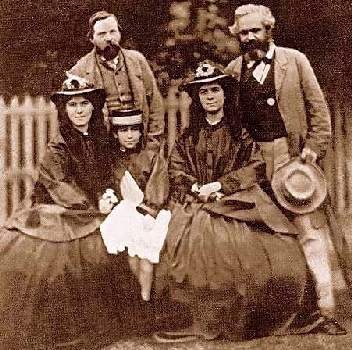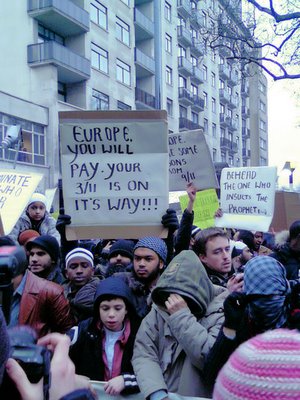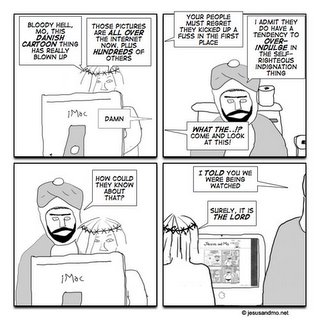"I'm Henry the 8th I am I am..."
Why is the government seeking the power to pass far-reaching laws without parliament's approval?
Marcel Berlins, The Guardian Wednesday, February 15, 2006
Some have called it the Henry VIII bill; one MP thought Stalin would be a more appropriate dictator to put his name to it. A leading academic refers to it as the "abolition of parliament bill". You get the point. The bill's real title is bland and boring to the point of soporific, which may be why it hasn't been much noticed; but underneath the benign facade of the legislative and regulatory reform bill lurks a machinery that would give the government the power to pass far-reaching laws without the bother of getting the approval of parliament.
On the surface, the bill is aimed at removing regulatory burdens on business by using short-cut procedures which wouldn't require parliamentary debate. The same process would also put into law uncontroversial recommendations by Britain's law commissions, the government's legal thinktanks. All that seems not only reasonable, but positively helpful to the efficiency of law-making. But look again, and Henry VIII comes into the picture. What the government has inserted into the bill is a way of allowing laws to be passed by a minister's order, which bypasses parliament altogether.
Well, so what? We're only talking about minor, technical laws which don't raise any controversial issues, aren't we? No, we emphatically are not. Try this one. It will become possible for the government, by ministerial order, without a debate in parliament, to create new criminal offences, punishable with less than two years imprisonment. It could also, according to Cambridge law professor John Spencer (who is not alone in his analysis), introduce house-arrest, give the police stronger powers of arrest and interrogation, set up new courts, and in effect re-write the rules on immigration, nationality, divorce, inheritance and the appointment of judges. Yes, there are safeguards written into the bill supposedly to prevent this sort of dictatorial behaviour, but my experience of safeguards is that they look better on the page than they perform in practice.
OK, you say, the government may have the legal power to do all those things, but is it seriously being suggested that it will really use such methods to pass laws it doesn't feel like putting to parliament? On the whole, no - and yet, in our current overcharged political climate, it is not too fanciful to imagine the government using every procedural trick to impose laws on the quiet, rather than face a parliamentary storm.
What bothers me most is that the government wants these powers in the first place. They are constitutionally dangerous, giving to the executive what should be a function of the legislature. And they are unnecessary. It would not have been difficult to achieve the bill's admirable, limited objectives without arming ministers with such questionable, wide-ranging powers. So why is the government so insistent on keeping the Henry VIII provisions if it doesn't intend on using them?
Of course, the Government have no intention of changing anything and as the following piece from Chicken Yoghurt argues, it is those dyed in the wool friends of democracy, big business, who will benefit from the Sod Parliament Bill:
Murphy's Law, Wednesday, February 22, 2006
When I finally succumb to the massive and catastrophic stress-induced brain embolism that is to be, no doubt, my final destination, the coroner will be able to pinpoint the exact time of my terrible and furious demise to whenever the pointless junior government minister, with a dangerous and unpopular piece of new law to sell, was interviewed on either the Today programme or PM that day.
This morning it was the turn of Jim Murphy, Parliamentary Secretary to the Cabinet Office, to usher me just that little bit closer to the big dirt bath. Murphy was the luckless soul sent onto the Today programme to defend the Furtherance of Unaccountable Government Bill.
For those just coming in, otherwise known as the The Legislative and Regulatory Reform Bill, this harmless-sounding piece of proposed legislation has bothered those of us who think that our barely accountable public servants - along with our not at all accountable public servants - should be kept on a short lead.
This is arcane, hard to engage with stuff but nonetheless has some pretty far-reaching consequences should this new legislation's power fall into the wrong hands. It's about how we are governed and what those to who we lend power do with that responsibility. Put simply, the The Legislative and Regulatory Reform Bill, as Marcel Berlins explained in the Guardian the other day [and above!], will make it...
...possible for the government, by ministerial order, without a debate in parliament, to create new criminal offences, punishable with less than two years imprisonment. It could also, according to Cambridge law professor John Spencer (who is not alone in his analysis), introduce house-arrest, give the police stronger powers of arrest and interrogation, set up new courts, and in effect re-write the rules on immigration, nationality, divorce, inheritance and the appointment of judges.
That's a pretty disturbing list, I hope you'll agree, particularly under this Government who are determined to be harder and nastier than anybody else when it comes to The War Against Terror. However, taking the basic premise that we're not dealing with Darth Vader and friends here, I think we can say that if/when this bill is passed into law, dissidents aren't suddenly going to find themselves locked in their homes with their knackers wired to the mains.
But this is to forget the law of unintended consequences and as I said the other day, when your thirst for efficiency, or for at least the facade of efficiency, produces the same outcome as if you'd set out to be a bastard, you can't really be too sore, in my opinion, if people start refusing to make the distinction. "I didn't mean to hurt you," often doesn't impress those on the receiving end. It's a trust thing.
Murphy, in his interview, did at least give a few a pointers as to what intentions lie behind the bill and just what the Government mean when they say they will place "safeguards" within it. As to why we need the bill, Murphy played his joker, otherwise known as the Armageddon Gambit. Don't argue your case on its merits, just scare the shit...
The real danger is what happens if we don't introduce a bill of this sort. We are trying to do all we can to maintain UK competitiveness, business competitiveness, economic growth, employment levels in a global economy where we face challenges from the emerging economies.
You hear that? If we don't get this bill, we'll be swept away by the Yellow Peril. Don't blame Jim when you're sewing Nike Trainers for a bowl of rice a day - it'll be those bastard urban intellectuals' fault for not letting him have his way.
So where's the pressure for this bill coming from? Here's the clue: UK competitiveness, business competitiveness, economic growth, employment levels. The "stakeholders" in this bill are the CBI, the Federation of Small Businesses, the Institute of Directors, British Chambers of Commerce.
Maybe paying a bunch of honking, low-wage conservatives massive salaries is all that stands between me and a third world lifestyle. I'm not a complete idiot, maybe British business is being choked by red tape. Frankly, I don't really care enough to find out, although anything that might make Digby Jones' life slightly less pleasant can't be all bad if you ask me.
But you would have thought that that Britain's business community would have had the law of unintended consequences closer to the front of their minds when they lobbied for this bill, particularly after Gary Mulgrew, Giles Darby and David Bermingham fell foul of the Extradition Act 2003. The CBI were sanguine about swarthy suspects being sent to Guantanamo under the act but less happy when it was applied to wholesome white collar types. Where's Martin Niemöller when you need to misquote him?
But all is well. There are safeguards to protect us:
The relevant select committees of the House of Commons will have a veto on every single proposal.
For those with rich and fulfilling lives who don't know what select committees are, here's how Charter88 defines them:
Select Committees of MPs carry out detailed investigations into policy matters and government performance, and produce detailed reports and recommendations. Sometimes they will draw up and recommend new legislation.
Hurrah, you cry, select committees will save us. Ah, well, Charter88 continue...
But there the Committees' powers end: they have no right to ensure that their reports or recommendations or proposed Bills are debated by parliament.
...and it gets worse...
Currently select committees, whose job is to investigate government actions and performance, are appointed by the government - i.e. the whips draw up the list which is then voted for en bloc in the House.
Members or select committees are placemen allocated according to the electoral makeup of Parliament. What if, and I know this is a cynical point of view, any scrutiny of new laws proposed by a government under this new power divided along party lines with the dominant (that is, government) party winning the day?
Regardless of party loyalties, however, it's still MP's faults that we need to give the Government power to do whatever it likes. As Murphy said:
We still have a one-size-fits-all approach to better regulation. So regardless of how controversial or the scale of a proposal, it still has to go through exacting parliamentary scrutiny which some times can take a number of years. That's not fit for purpose.
MPs. The lazy bastards. Clogging the arteries of the mother of parliaments. And on our dollar as well. But if that's the case - and Parliamentary scrutiny isn't always the constitutional bottleneck Murphy would have us believe - why does Andrew Miller, Labour MP for Ellesmere Port and Neston and chairman of the Commons Regulatory Reform Committee (on this occasion, granted, no placeman he) say:
Our report demonstrates that the current parliamentary procedures are not responsible for delaying regulatory reform orders.
Our evidence shows that departments themselves are slow in identifying the unnecessary regulations, in bringing the proposals for orders to Parliament and in making the orders once Parliament has made its recommendation on individual reforms.
Government departments. The lazy bastards. Clogging the arteries of the mother of parliaments. And on our dollar as well.
The interview's worth listening to if only to hear how little Murphy gave away. He's few bones to throw to the dogs on this one. Oh, and the - ha ha! - jokey exchange about Prince Charles - ha ha! - and his so-called dissidence right at the end, oh, it's a hoot.
So, as others have said it's time to do something. My MP doesn't answer my letters so I'm left whistling in the dark somewhat. Her voting record wouldn't inspire confidence even if I wasn't being ignored. So I charge you, dear reader, with the noble quest of rescuing democracy.
To conclude - with the requisite glib, broader point - in the nine years since they came to power New Labour have pretty much made it up as they went a long. That's what happens when you swap principle for power at any cost - the star you used to sail by is obscured by clouds and you have to guess where you're heading. There are no lighthouses. When Gordon Brown ascends to the throne he may find himself a Scot on the rocks.
It seems that everything worthwhile in this country can be thrown away in the name of "competitiveness". When we become just one great bloody big theme park for visiting members of the Chinese Communist Party (who will all probably go to see the Interactive Thatcher Mausoleum) perhaps someone will suggest that we took a wrong turning somewhere. One thing I can predict with a fair amount of confidence: whoever follows Blair, whether it be Gordon Brown, David Cameron or a coalition of "Reformers", I don't think The Legislative and Regulatory Reform Act (if it is allowed to come into force) will be removed from the statute books in a hurry.
















